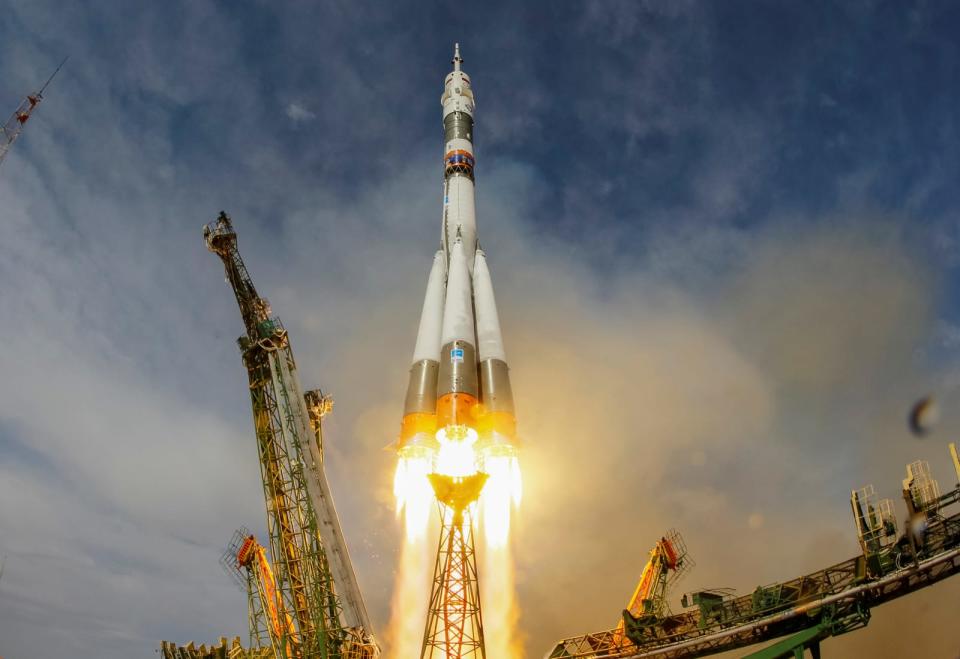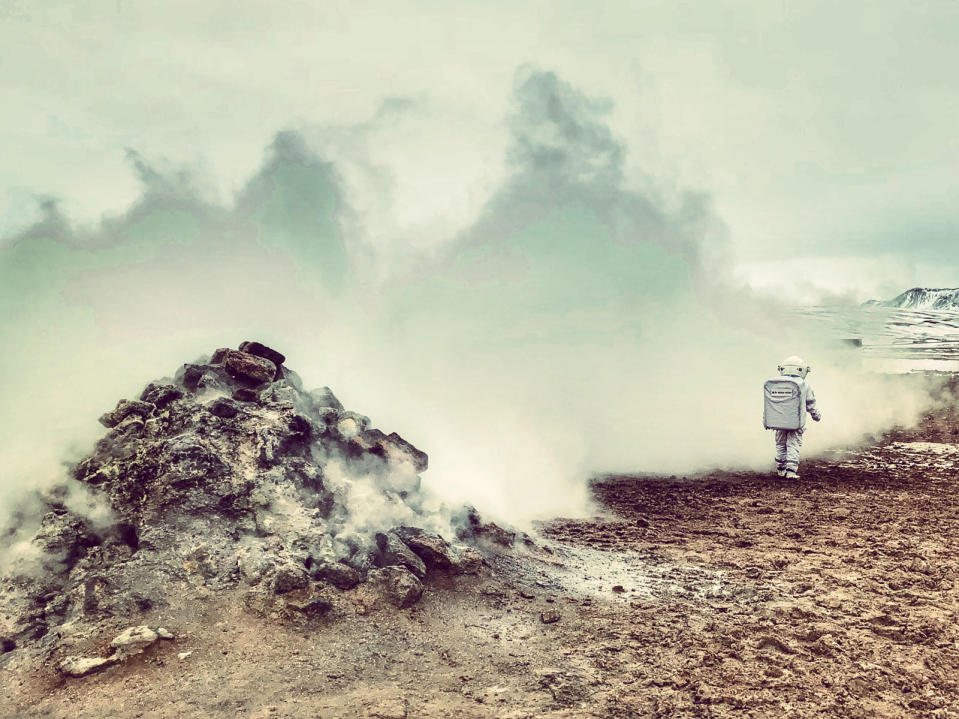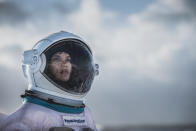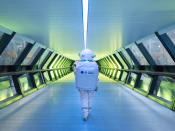The app promising to make anyone an astronaut
Just like Mars One, Space Nation is pushing an idea that doesn’t have funding yet.
Every kid dreams of becoming an astronaut, of exploring what lies beyond our planet out there in the unknown. It's a romantic notion, but something few ever achieve. The growth of the private space industry in recent times has made it seem all the more attainable, however. Under current projections, SpaceX, Blue Origin and Virgin Galactic will start taking space tourists on trips next year, perhaps even earlier. Naturally, seats on these craft are reserved for the extremely wealthy right now, but there could be another way. Space Nation is a company that's promising anyone can become an astronaut, irrespective of how deep their pockets are. And all you need to do to become a viable candidate is to play a bunch of mobile minigames.
The company plans to recruit a pipeline of everyday astronauts through its Space Nation Navigator app, available for free on Android and iOS. The app's range of minigames, quizzes and other challenges function as a sort of test -- how you perform will decide whether you have what it takes to make it to the next stage. Space Nation intends to run its first selection process as early as October this year, but no later than the start of 2019. Over the course of roughly three months, players from all over the world will be assessed for their compatibility and invited for psychological and health assessments. Of these, the 100 best candidates will be put through an astronaut-training program over the course of a few months, and one will be chosen to make a suborbital flight before the end of next year.

In the longer term, the intention is to repeat the exercise and get more people past the suborbital phase. Additional, more specialist training in certain academic disciplines will then take place with the idea of creating bona fide career astronauts destined for residencies on private space stations. In that sense, the initial training is like a taster course, and not entirely necessary for a passenger on, say, Virgin Galactic. But let's not get ahead of ourselves, because the amount of money the company will need to raise to realize all this is astronomical (pun intended).
Though there's no selection process happening right now, there's already plenty going on in the Space Nation Navigator app with rotations of daily and weekly challenges. Some encourage you to move around -- for example, walking the same distance as a planet's orbit within an hour (where one meter is equivalent to 1 million kilometers). Others are relatively hard, five-minute quizzes on topics like survival and space exploration that go beyond common sense answers. Thanks to the app, I now know an ammonia leak is one of the worst things that can happen in space.
There are also challenges that take the form of quick minigames, such as shooting a radio wave from Earth and timing it so it collides with a passing satellite. On the face of it, it's hard to imagine such a collection of simple challenges can form the basis of a legitimate astronaut selection process. But according to Kalle Vähä-Jaakkola, "Captain" and co-founder of Space Nation, it's more robust than it appears. The company hopes to help dispel the myth that you have to be extra special to become an astronaut. "You think you need to be superfit physically and supersmart. And of course all those help, but you don't need those to get to space," he told me.
Age isn't a massive factor, either. John Glenn was 77 when he spent nine days on the space shuttle Discovery in 1998, for instance. According to the Space Nation co-founder, apart from living a relatively healthy lifestyle, the skills most important for astronauts are creative-problem solving, teamwork and being able to learn new things and apply them. He recalls his astronaut friend Michael López-Alegría saying once: "If you can build Ikea furniture from the instructions, you can probably be an astronaut."
Though I'd argue taking a picture and posting it to the app's community feed isn't a great test of communication skills, Vähä-Jaakkola says that as simple and gamified as everything might appear, the challenges are genuine tests of aptitude -- in much the same way intelligence agencies use puzzles to recruit potential spies. Space Nation hasn't dreamt up the recruitment program all on its own, though. It's had a lot of help from NASA.

Under a Space Act Agreement between the two, NASA is providing Space Nation with "technical expertise as well as agency records, imagery and video" to aid development of the app. New features and challenges are being added every few months in the run-up to the first selection process, with Space Nation leaning on the agency to ensure they're always relevant to the core skills required of an astronaut. Stinger Ghaffarian Technologies (SGT), the private firm that trains NASA astronauts and helps with ISS operations, is another high-profile partner. SGT will be responsible for schooling the Space Nation candidates.
These collaborations add significantly more weight to the Space Nation concept, but then the question becomes ... why? Well, like many private space companies, there seem to be two very different but not necessarily incompatible motivations. At the idealistic end of the spectrum, Space Nation hopes to democratize off-world travel. Aside from molding everyday astronauts, the goal is to "bring space closer to people in a relatable manner." As Vähä-Jaakkola puts it, "we aim to create the experiences and media" that give people "new perspectives." This starts with the Navigator app, but he also notes less-ubiquitous technologies like VR and AR that could be used to similar effect in the future.

Vähä-Jaakkola talks of "the overview effect" most astronauts experience when they see Earth from the vastness of space. It's a feeling of heightened awareness of how special our planet is, and Space Nation hopes even people who have no interest in going into space, or can't for reasons such as health, will be inspired by what it ends up doing.
Simply playing around in the app, thinking about what makes a good astronaut and developing some of those skills is part of it. "Already all of us are the crew of spaceship Earth and we need to better ourselves to solve our current and future challenges," Vähä-Jaakkola told me.
Beyond the romantic, there's the financial motivation. Space Nation is a business, and one that intends to turn a profit. For now, Space Nation is working with roughly €6 million in funding from initial investors and an equity crowdfunding campaign.
In other words, not a lot given the costs involved with space travel. The last time NASA bought seats on Russia's Soyuz spacecraft -- the best option for manned missions, according to Vähä-Jaakkola -- the agency paid $74.7 million per person for a round trip to the ISS. Tickets on Virgin Galactic's suborbital flights even cost $250,000 a piece, though the waiting list is years long now on account of more than 650 people reserving their seat already.

The company sells merchandise like caps and T-shirts, but the Navigator app is where the majority of initial cash flow is expected to come from. Fail one of the challenges and you either have to watch an ad or pay in-game coins to retry it. You earn these coins, but they can be bought with real money too. Space Nation promises that when the selection phase begins, how much you play won't increase your chances. Merit is more important than patronage.
The next piece of the puzzle is to film the training process and beyond, making money on content rights, ads and sponsorships. Sound familiar? Mars One's business model is similar, revolving around selling broadcasting rights to a reality TV show set in the first off-world colony. It's slow going at Mars One, however. In September last year, some vague projections were released that attempt to show the project is still financially viable. Mars One does admit funding is its biggest challenge, though, and electing potential candidates as well as conducting feasibility studies is as far as it's gone in seven years.
Vähä-Jaakkola says Space Nation came about independently of Mars One and is a significantly different company, with simpler goals and several routes of funding. For example, the firm has purchased the equivalent of a lab bench on the ISS: a 180cm3 workspace that it'll be renting out to third parties for zero-gravity experiments.
Still, sending everyday astronauts into space and turning a profit selling in-game currency sounds implausible -- even with the help of ex-Angry Birds marketing magician Peter Vesterbacka. Vähä-Jaakkola insists the math checks out but understands the skepticism. He says it's hard to see all the opportunities of the commercial space age when you're not embedded in the industry. "People saw a flying sports car in space, but next year they will see wealthy individuals buying tickets to get there. People's eyeballs are going to pop out."

"It's very understandable because we went to the moon about 50 years ago, and then we've fallen back to lower-earth orbit." Just as the internet has enabled search engines, social networks and streaming services, rockets from the likes of SpaceX and Blue Origin opens space up to new over-the-top providers -- firms that won't launch anything themselves, but create new ventures riding on their backs.
Space Nation is partnered with Axiom Space, another one of these OTT providers aiming to build a private space station. The plan is to attach a module to the ISS in 2022 and then begin building out from there, eventually detaching to become a self-contained station when the ISS is retired. Space Nation astronauts are expected to be posted there in the future. Axiom already has a product, too. Starting 2020, hand over $55 million and the firm will train you and send you up to the ISS for a 10-day holiday.

And so, Space Nation is more than just an app promising anyone can become an astronaut. Vähä-Jaakkola believes getting people interested in space is key to making a company riding on the coattails of SpaceX and Blue Origin successful. And what better way to start than to create a mobile game that gives good players a trip up there for themselves? "We see that it's a huge necessity for more people to be aware of what is happening and to be able to be part of it, not just seeing it from the sidelines."
But the reality of actually putting people into orbit, particularly the exorbitant costs involved, means talk is cheap. Right now, Space Nation is an app, an idea and little more.





















